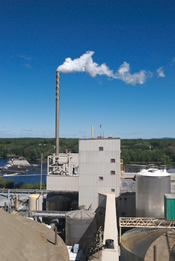Why Maine Why Now?
https://www.youtube.com/watch?v=pjCa81lARaI
FBRI’s future contributions to the forest economy.
Download the full version for later viewing.
(Windows Media Video, 42 MB)
For many generations of Maine residents and visitors, the woods, waters and wildlife of Maine’s forests are its defining cultural and economic heartland. Because new products made from wood fiber (bioproducts) have the potential to ensure Maine’s forest values for future generations, a partnership between the University of Maine, the forest and the laboratory may prove essential.
Recent economic recommendations from the Brookings Institution (“Charting Maine’s Future”) are clear that retention of “place” and our state’s natural resources are essential economic tools and that innovation to unlock more value in our resources will define our future. The fast evolving field of wood bioproducts offers new economic formulas to support the retention of Maine’s forests as undeveloped landscapes while offering significant opportunities to reinvigorate unused or at risk industrial capacity at mills and manufacturing sites.

- Maine is the most heavily-forested state in the nation
- Maine is an integral part of the Northern Forest which covers the upper mid-west, upper New England, and large portions of Ontario, Quebec, and the Maritime Provinces in Canada… an ecological system not found in other regions of the U.S.
- Maine has a highly integrated wood products industry (energy, pulp & paper, sawmills, OSB, etc.) that is of primary importance to the state
- Maine has an internationally-established engineered wood composites research program at the University
- Maine has cutting-edge chemical and biological engineering expertise at the University
- Maine has the top Pulp & Paper research and education program in the U.S. at the University
- Maine is politically a historically “green” state, with governmental support solidly behind the environmental potential of this project
- Maine is publically committed to the development of a large-scale forest-based biorefinery as a technology validation and demonstration facility.
- Maine has the support of essential relevant stakeholders (forest landowners, industry, small business, educational institutions, and government) to grow an innovative bio-economy
Maine is uniquely positioned with all the essential and creative ingredients, tools, and relationships to evolve a bio-economy that is sustainable, marketable and extraordinarily useful as a national and international model.
